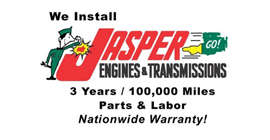AUTONET TV
Archive for January 2023The Last Gas (Fuel Pump Replacement).Posted January 29, 2023 9:20 AMYou're heading down the road and you notice your vehicle is sputtering, like it's running out of gas. But the gauge show's it's still got a quarter of a tank. So what gives? It could be that your fuel pump is failing, meaning your engine is not getting enough gas to run properly. While fuel pumps are built to last a long time, sometimes they fail. Other symptoms you may have a bad fuel pump include your vehicle stalling and then refusing to start again, the engine overheating or a hum or whirr coming from around the gas tank. Or, your Check Engine light may come on. Most fuel pumps are in the gas tank. They have a small electric motor in them. When you bring your vehicle to our service center, a technician will run tests to confirm the fuel pump is getting power to it but has failed. Some vehicles have an access panel so the fuel pump can be removed and replaced. But in some vehicles that don't have that access panel, the technician has to drain the fuel and take the tank out of the vehicle to be able to replace the fuel pump inside. Some parts such as brackets that attach the pump can be reused when the new fuel pump is installed. Most technicians will recommend replacing the fuel filter at the same time the fuel pump is changed out. If the technician has to remove the fuel tank, they'll also check for rust and corrosion and replace any affected parts. Keep one thing in mind - your vehicle's fuel pump is in the fuel tank because it's kept cool and lubricated by the gasoline in the tank. Try not to let your fuel level go below a half or quarter of a tank to maximize the life of your fuel pump. Also, try to use Top Tier gasoline that has higher standards than some other fuels. Your engine—and fuel pump—will thank you. AutoChoice Service Center Inc. Put the Brakes On! (Brake Caliper Replacement)Posted January 22, 2023 9:47 AMKeeping your vehicle's brakes in top shape is one of the most important things you can do for your safety and those on the road with you. Most drivers know a little about brake pads and rotors but maybe not so much about another brake component called the calipers. Disc brakes work by a mechanical system that presses your brake pads against discs called rotors (you can usually see these discs through your wheels). The friction stops your vehicle smoothly when everything is working the way it should. The calipers use the hydraulic pressure of the brake fluid to apply the stopping power. After they've been on your vehicle for a while, the calipers can get stuck or wear out. If calipers on one side of the vehicle work correctly and not on the other, you might feel a pull in one direction. You might feel the same kind of pull if the caliper is stuck and is applying constant pressure. You might hear scraping or squealing coming from a stuck caliper and you might smell burning on that side. The friction from a caliper that's always applying pressure may cause that wheel to heat up, so after you've pulled your vehicle off the road safely, the wheel with the stuck caliper will might feel hotter than the others Because there are many different components to the brakes, it's best to leave the diagnosis and repair to a trained technician. They will run each wheel through a series of tests and inspections that can pinpoint the problem. Sometimes it involves more components than just the caliper that may need changing at the same time. The best way to make sure your brakes will perform well is to is to have our service center perform regular inspections and follow the vehicle manufacturer's recommended service. That way your brakes will be ready, willing and able when you call on them to put a stop to things. AutoChoice Service Center Inc. Oil's Well That Ends Well (Oil Change Grades and Weight)Posted January 15, 2023 8:06 AMChanging your oil regularly is one of the most important things you can do to keep your vehicle running well. And knowing the right type of oil to use is also very important. Engine oil is classified by weight, but it doesn't refer to how much the oil would weigh if you put it on a scale. It refers to viscosity, or how easily the oil flows through the engine. Most engines operate normally at around 210°F/99°C. The viscosity, or weight, is assigned a number by how well it flows at that temperature. The lower the number, the more freely it flows. Most vehicle engines use what's called a multigrade oil which behaves differently in different temperatures. Multigrade oils have a "W" in their viscosity number that you may have seen on a bottle of oil, something like 5W30. The W stands for winter and shows how freely it flows in colder temperatures. That means a 5W30 oil will behave like a 5 weight oil in lower temperatures (less viscous or thinner) and a 30 weight oil in warmer temperatures (more viscous or thicker). That's important on a cold day because the oil needs to behave like a thinner oil when you start your engine since it need to lubricate engine components immediately to protect the metal components. Then as the engine warms up, it behaves like a thicker oil to prevent friction among those parts. Pretty neat trick, right? The type of oil you use can differ depending on what type of climate you operate your vehicle in and how your vehicle is used (carrying big loads, towing, etc.). Your owner's manual contains several different recommendations based on these factors. Your service advisor can recommend the right oil for your needs. Like Shakespeare said, "Oil's well that ends well." AutoChoice Service Center Inc. Snake in the Engine (Serpentine Belt)Posted January 8, 2023 7:17 AMThere's a belt that snakes through your engine. It's even named for a snake, the serpentine belt. It'll bite you when it breaks, possibly leaving you stranded. So, it's good to know a little about this snake-like belt. In early engines, there were lots of belts. They were used to convert the rotating power of the engine to turn a mechanical part. But engineers had an idea. Why not consolidate all those belts into one that ran a bunch of different parts simultaneously? Voila! The serpentine belt. It's found in the front or side of your engine unlike older belts which were often in a V shape, the serpentine belt has ribs on it which more effectively connect with the pulleys that power the other components. A serpentine belt may power the water pump, power steering pump, alternator, and the air conditioning: all from one crankshaft. Now, all that's fine when everything is working well and the belt is intact. But when a serpentine belt wears, gets loose, or breaks, it can affect many engine components at once. Not an ideal situation. If you hear squeals coming from the engine compartment, see a battery light, or the engine overheats, those could be signs that your serpentine belt needs replacing. The good news is that they usually last a long time, from 60,000-100,000 miles or 100,000-160,000 km. Still, they don't last forever, and your vehicle's manufacturer usually recommends replacing them when they've gone close to the expected maximum. It’s also recommended that you replace the pulleys and belt tensioner at the same time as they have the same service life. Regular maintenance and inspection of the serpentine belt is not only a good idea; it’s one of those things that you should not let "slip" by. AutoChoice Service Center Inc. TCB your PCV (PCV Valve Replacement)Posted January 1, 2023 7:24 AMYour gasoline engine goes through some exhausting work. Yes, it's truly exhausting, as in: it produces exhaust! And when your engine starts behaving like it's exhausted, such as running poorly or getting lousy fuel economy, the trouble may be something called a PCV valve. Did you know it's a series of explosions that creates the power in your engine? The spark plugs ignite a mixture of gasoline and air and BANG! A whole bunch of those and you're engine is humming away. Leftover vapors from those explosions go into your crankcase, which is also a place where engine oil goes. Those vapors still have a lot of unburned fuel in them, and if they had nowhere to go, they'd turn your oil into a thick mess called sludge, not good for a smooth running engine. Engineers came up with an idea. Re-direct those gasses building up in the crankcase into the engine's air intake and mix them with fresh air. That way the unburned fuel could go through the engine again and produce power. It also means the unburned fuel doesn't pollute the air. The part that makes that happen is called the Positive Crankcase Ventilation (PCV) valve. Besides reducing pollution and preventing the oil from turning to sludge, the PCV valve also relieves pressure in the crankcase, reducing the potential for oil to leak. One of the reasons you should get your oil changed as frequently as your vehicle's manufacturer recommends is that it helps reduce chances for problems with the PCV valve. After a while, the PCV valve can itself get gummed up and stick, and the driver may notice oil leaks, reduced power or engine hesitation. That's why it's important to make sure the PCV valve is operating like it should, and often it can be diagnosed during a visual inspection by our technicians. Replacing a PCV valve is usually quick and inexpensive. After it's done, your vehicle will run with the performance and fuel economy you're used to. Goodbye exhaustion! AutoChoice Service Center Inc. | ||
SearchArchiveDecember 2009 (4)January 2010 (2) February 2010 (4) March 2010 (4) April 2010 (4) May 2010 (3) June 2010 (1) July 2010 (3) August 2010 (5) September 2010 (2) October 2010 (3) November 2010 (4) December 2010 (5) January 2011 (4) February 2011 (4) March 2011 (5) April 2011 (4) May 2011 (4) June 2011 (2) August 2011 (4) September 2011 (3) October 2011 (1) December 2011 (4) February 2012 (1) March 2012 (5) April 2012 (4) May 2012 (1) June 2012 (3) July 2012 (1) August 2012 (1) November 2012 (1) December 2012 (2) March 2013 (1) April 2013 (3) May 2013 (2) October 2013 (5) November 2013 (2) January 2014 (2) February 2014 (4) March 2014 (1) July 2014 (4) August 2014 (7) September 2014 (4) October 2014 (5) November 2014 (4) December 2014 (5) January 2015 (4) February 2015 (4) March 2015 (4) April 2015 (4) May 2015 (2) June 2015 (6) July 2015 (2) September 2015 (3) October 2015 (3) November 2015 (5) December 2015 (1) March 2016 (5) April 2016 (4) May 2016 (5) June 2016 (4) July 2016 (4) August 2016 (5) September 2016 (4) October 2016 (5) November 2016 (4) December 2016 (4) January 2017 (5) February 2017 (4) March 2017 (4) April 2017 (4) May 2017 (5) June 2017 (4) July 2017 (5) August 2017 (3) September 2017 (3) October 2017 (5) November 2017 (4) December 2017 (3) January 2018 (5) February 2018 (4) March 2018 (4) April 2018 (5) May 2018 (4) June 2018 (4) July 2018 (5) August 2018 (4) September 2018 (5) October 2018 (4) November 2018 (4) December 2018 (5) January 2019 (5) February 2019 (4) March 2019 (5) April 2019 (4) May 2019 (4) June 2019 (5) July 2019 (4) August 2019 (4) September 2019 (5) October 2019 (4) November 2019 (4) December 2019 (5) January 2020 (5) February 2020 (4) March 2020 (5) April 2020 (4) May 2020 (5) June 2020 (4) July 2020 (3) August 2020 (5) September 2020 (4) October 2020 (4) November 2020 (5) December 2020 (4) January 2021 (6) February 2021 (4) March 2021 (4) April 2021 (4) May 2021 (5) June 2021 (4) July 2021 (4) August 2021 (5) September 2021 (4) October 2021 (5) November 2021 (4) December 2021 (4) January 2022 (6) February 2022 (4) March 2022 (4) April 2022 (4) May 2022 (5) June 2022 (4) July 2022 (5) August 2022 (4) September 2022 (4) October 2022 (5) November 2022 (4) December 2022 (4) January 2023 (5) February 2023 (4) March 2023 (4) April 2023 (5) May 2023 (4) June 2023 (4) July 2023 (5) August 2023 (4) September 2023 (3) October 2023 (1) January 2024 (1) February 2024 (4) | CategoriesParts (7)Automotive News (8)Service Standards (12)Maintenance (52)Fuel System (46)Transmission (11)Tires and Wheels (40)Monitoring System (3)Dashboard (3)Steering (14)Battery (20)Service Intervals (9)Brakes (22)Cabin Air Filter (8)Drive Train (9)Fluids (16)Shocks & Struts (9)Inspection (10)Headlamps (6)Timing Belt (6)Windshield Wipers (9)Check Engine Light (6)Alignment (16)Cooling System (19)Air Conditioning (17)Safety (6)Differential Service (3)Diagnostics (5)Fuel Economy (10)Engine Air Filter (2)Exhaust (12)Keys to a long lasting vehicle (4)Diesel Maintenance (1)Suspension (3)Serpentine Belt (6)Older Vehicles (4)Emergency Items (1)Alternator (6)Winter Prep (7)Fuel Saving Tip: Slow Down (2)Auto Safety (6)Trip Inspection (4)What Customers Should Know (81)Warranty (1)Tire Rotation and Balancing (3)Wheel Bearings (1)Oil Change (7)Safe Driving (1)Customer Detective Work (1)Tires (10)Spark Plugs (2)Water Pump (1)Winter Tires (1)TPMS (3)Transfer Case Service (1)PCV Valve (2)Brake Service (4)Fuel Pump (1)Shocks and Struts (1) | |
Reviews
|
I had my car in a while back for brake work and once again I was extremely pleased with Auto Choice. They are professional and honest (a rare combination) and I know that the work will be done correctly. I drive a Subaru and I completely trust my technician Jake to diagnose and expertly correct any issues that come up. I definitely will be back the next time I need anything car related. Thank you Jake and Auto Choice! Cathy Kinsman, 04/17/2024 |
|
|











